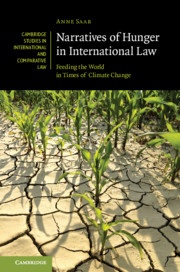Book contents
- Narratives of Hunger in International Law
- Cambridge Studies in International and Comparative Law: 140
- Narratives of Hunger in International Law
- Copyright page
- Contents
- Prologue
- Introduction
- 1 Climate Change, Narratives of Hunger, and International Law
- 2 Tackling Hunger through International Climate Change Law
- 3 The Seed Wars and Intellectual Property Rights
- 4 Human Rights, Climate Change, and the Right to Food
- 5 How International Law Upholds Fundamental Assumptions about Hunger
- Conclusion
- Bibliography
- Index
- Cambridge Studies in International and Comparative Law
5 - How International Law Upholds Fundamental Assumptions about Hunger
Published online by Cambridge University Press: 28 March 2019
- Narratives of Hunger in International Law
- Cambridge Studies in International and Comparative Law: 140
- Narratives of Hunger in International Law
- Copyright page
- Contents
- Prologue
- Introduction
- 1 Climate Change, Narratives of Hunger, and International Law
- 2 Tackling Hunger through International Climate Change Law
- 3 The Seed Wars and Intellectual Property Rights
- 4 Human Rights, Climate Change, and the Right to Food
- 5 How International Law Upholds Fundamental Assumptions about Hunger
- Conclusion
- Bibliography
- Index
- Cambridge Studies in International and Comparative Law
Summary
- Type
- Chapter
- Information
- Narratives of Hunger in International LawFeeding the World in Times of Climate Change, pp. 136 - 161Publisher: Cambridge University PressPrint publication year: 2019



